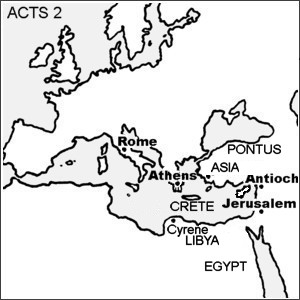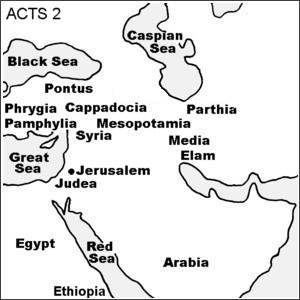
Acts 2:1-13
—Verse by verse
This page is a study of Acts 2:1-13. These verses tell of how the apostles received power through a baptism of the Holy Spirit. This fulfilled the promise Jesus had made to them just before his ascension (Acts 1:8).
The Apostles Receive Power From on High.
Acts 2:1-13
¶“1When the day of Pentecost was in full swing, they were all together, fiercely united. 2And a sound came unexpectedly out of Heaven, as borne of a violent wind, and it filled all the house where they were sitting. 3Also they could see divided tongues like flames, and one sat upon each of them. 4They were all filled with the Holy Spirit, and began to speak with other tongues, as the Spirit gave utterance to them.” (Acts 2:1-4).
¶“5Many Jews were staying in Jerusalem, pious men from every nation under heaven. 6The crowd gathered as the news spread, and they were confounded, because each heard them speak in his own language. 7So they were all amazed and marvelled, saying to each other, 'Look, aren't all those who speak Galilaeans? 8How then do we each hear in the language of our birthplace? 9We are Parthians, and Medes, and Elamites, and the dwellers in Mesopotamia, and in Judaea, and Cappadocia, in Pontus, and Asia, 10Phrygia, and Pamphylia, in Egypt, and in the parts of Libya about Cyrene, and strangers of Rome, Jews and proselytes, 11Cretans and Arabians, we hear them speak in our own tongues the wonderful works of God!' ” (Acts 2:5-11).
¶“12They were all amazed, and were in doubt, saying one to one another, 'What can this mean?' 13Others mocked: they said, 'These men are full of sweet wine!' ” (Acts 2:12-13).
Verse 1
¶ "When the day of Pentecost was in full swing, they were all together, fiercely united (Acts 2:1).
- Pentecost Pentecost (the feast of weeks) is a Jewish festval day —the 50th day after the Passover. (The name Pentecost means fifty.)
- Who Were "They"? There is some debate whom "they" refers to in this verse. Was it only the apostles mentioned in the previous verse Acts 1:26?. Or was it the 120 persons mentioned earlier (Acts 1:15).
- Some cite the "rule of grammar" which may be stated as follows: The antecedent of a pronoun is the nearest previous agreeable noun. That would be "apostles". The Greek language in which Luke was writing does not always adhere to that rule however.
- Others point out firstly that the pronoun is actually a phrase, "they all" which strongly suggests the whole group. Secondly, the prophecy Peter quoted as fulfilled, seems to require a larger group (Acts 2:16-18, Joel 2:28-29). Thirdly, another group of people later had the same thing happen to them and it happened to the entire group (Acts 10:24,33,44, Acts 11:15-17).
- The best way to decide who they were who received the baptism of the Holy Spirit, is to go back to the beginning of chapter one. Jesus "gave orders to the apostles whom he had chosen" (Acts 1:2), and it was to them that he promised the baptism of the Holy Spirit and the consequent power (Acts 1:4-8).
Verse 2
¶ "A sound came unexpectedly out of Heaven, as borne of a violent wind, and it filled all the house where they were sitting." (Acts 2:2).
- A Significant Sound This sound symbolises the power of the Holy Spirit. In the Bible, the words for wind and for spirit are similar. In the Greek the word for Spirit πνευμα, pneuma, comes from πνεω, pneo, to blow air. The sound was therefore appropriate.
Verse 3
¶ "And they could see divided tongues like flames, and one sat upon each of them." (Acts 2:3).
- A Significant Sight These divided tongues were symbolic of the languages or "tongues" that have divided human beings since the Tower of Babel. The Spirit’s gift of tongues would now enable the apostles to preach in the lanuages of every nation under heaven.
Verse 4
¶ "And they were all filled with the Holy Spirit, and began to speak with other tongues, as the Spirit gave utterance to them." (Acts 2:4).
- A Special Miracle The miracle on Pentecost was something very special. It was not promised that we should see it in our day, and it is clear that we do not see it. If the miracle at Pentecost were to occur today, we could hardly turn around and say, "Such miracles are not for today". That's because, if the Pentecostal miracle were happening, it would be undeniable proof of itself, and since we are honest we would have to acknowledge it without reservation.
- One Spirit But Different Manifestations The same Holy Spirit is given to all Christians, but the gifts and manifestations of the Spirit differ from person to person (Acts 2:38-39, 1Corinthians 12-4-11, Galatians 5:22-26).
- In the general teaching of the Bible, miraculous powers and signs and wonders have their place in God’s scheme of things, but they are unusual. The emphasis is upon the more common and constant manifestations: faith, hope, love, joy, peace These are much more powerful and wonderful than miracles. They are "the more excellent way" (1Corinthians 12:13)
- Other Tongues The term "other tongues" simply means languages other than the apostles’ own.
Verse 5
¶ "Many Jews were staying in Jerusalem, pious men from every nation under heaven." (Acts 2:5).
- An Appropriate Occasion God chose a very appropriate and opportune time to establish the church of Christ and begin the spread of the gospel throughout the world. The city was filled with "many... pious men from every nation". What better audience could there have been?
- Who Were the Jews? The name “Jews” means Judeans —the the remnant of Jacob’s descendants living in Judea and its capital Jerusalem. This was the only surviving part of the large kingdom of Israel over which David and Solomon had ruled. However the term Jews came to include all of Jacob’s descendants who migrated to various parts of the world, as well as their progeny. The Jews had synagogues all over the world, but the devout Jews journeyed to Jerusalem for special festivals such as Pentecost. The Jews scattered in foreign lands were known as the diaspora or "pilgrims of the dispersion" (1Peter 1:1).
Verse 6
¶ "The crowd gathered as the news spread, and they were confounded, because each heard them speak in his own language." (Acts 2:6).
- The first reaction to the miracle: "They were confounded." This reaction is just the sort of confusion that occurs when a crowd gathers in tumult around some sensation. This initial reaction doesn't mean much because it is not a thoughtful one.
Verse 7
¶ "And they were all amazed and marvelled, saying to each other, 'Look, aren't all those who speak Galilaeans?' " (Acts 2:7).
- The second reaction to the miracle: "They were "amazed and marvelled." This was the honest reaction of each person to what they personally observed. A sense of awe came over them. This reaction gives us the best measure of the miracle that occurred.
Verse 8
¶ "How then do we each hear in the language of our birthplace?" (Acts 2:8).
- Nature of the Miracle Each person heard the gospel in his or her own native language because the apostles were speaking those languages (Acts 2:4). The miracle was in the speaking described in verse 4, not in the hearing mentioned here in verse 8. The hearing was normal and natural hearing, but the speaking was a miraculous gift given to the apostles by the power of the Holy Spirit. The miraculous ability to speak in languages one has never learned is known as xenoglossia.
Verse 9
¶ " 'We are Parthians, and Medes, and Elamites, and the dwellers in Mesopotamia, and in Judaea, and Cappadocia, in Pontus, and Asia,' " (Acts 2:9).
- These nations, other than Asia, lie to the east and north of Jerusalem.
- Asia lies northwest of Jerusalem above the Great Sea and below the Black Sea.
Verse 10
¶ "Phrygia, and Pamphylia, in Egypt, and in the parts of Libya about Cyrene, and strangers of Rome, Jews and proselytes," (Acts 2:10).
- Phrygia and Pamphylia lie northwest of Jerusalem. They are regions of Asia.
- Egypt lies southwest of Jerusalem along the Nile river west of the Red Sea.
- Libya and Cyrene lie west of Jerusalem on the southern coast of the Great Sea.
- Rome is the capital of Italy and the Roman empire. It lies far northwest of Jerusalem.
- A proselyte is a gentile convert to Judaism, given most of the Privileges and status of a Jew.
Verse 11
¶ "Cretes and Arabians, we hear them speak in our own tongues the wonderful works of God!' " (Acts 2:11).
- Crete is an island in the Great Sea west of Jerusalem.
- Arabia is a desert nation. It lies southeast of Jerusalem.


Verse 12
¶ "And they were all amazed, and were in doubt, saying one to one another, 'What can this mean?' " (Acts 2:12).
- The third reaction to the miracle: "They were in doubt" Their amazement (verse 7) was short lived. A measure of disbelief and doubt set in. They asked, "What can this mean?" They started trying to find some explanation that might show that their eyes and ears were being tricked into imagining things. This is a sad reaction, because it reveals their lack of expectation, their unpreparedness for Messiah, their slowness of heart to believe all that the prophets had spoken.
Verse 13
¶ "Others mocked: they said, 'These men are full of sweet wine!' " (Acts 2:13).
- The fourth reaction to the miracle: "Some mocked." Some people are such skeptics and scoffers, that they make up any explanation, no matter how silly. "These men are full of sweet wine!" was the best they could do. They made no effort to test this hypothesis, because they knew it wouldn't fit the facts. Peter's rejoinder, "It is only the third hour of the day!" (Ac 2:15). was a mocking of the mockery. The real answer did not need to be spoken, for the miracle spoke for itself. It was obvious that these men were not alcoholics drunk in the morning. Peter left it unsaid that no drunkard could do what Peter and his fellows were doing.